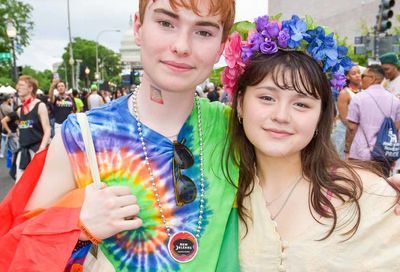Critical Court
Prop. 8 supporters find sympathetic ears in their quest to defend California's anti-gay marriage law
California Supreme Court Justice Ming Chin asked the lead counsel seeking to overturn the state’s 2008 initiative amending the state’s constitution to ban same-sex couples from marrying, ”If the governor and attorney general do not defend, then no one can defend it?”
After hedging and then getting some pushback from elsewhere on the bench, attorney Ted Olson replied, ”Yes.”

Ted Olson
(Photo by Alex J. Berliner)
The answer might sound surprising – and the California Supreme Court justices appeared to agree. In the oral arguments held on Sept. 6, the justices were not asking Olson about California courts – as would be expected – but instead were asking about federal courts, where Olson and David Boies are defending the appeal of a successful decision in U.S. District Court in San Francisco striking down the initiative, Proposition 8, as unconstitutional.
Once the state officials named as defendants decided not to appeal the August 2010 decision in the case brought by the American Foundation for Equal Rights, the proponents of Proposition 8 were left as the only party attempting to appeal U.S. District Court Judge Vaughn Walker’s decision declaring Proposition 8 unconstitutional.
Before the Ninth Circuit can reach the questions about ”fundamental rights” like marriage and issues of ”equal protection” of the laws, the judges first need to decide that the proponents have the right to be there.
That question led to the debate in the California Supreme Court on Sept. 6 over whether the proponents had ”particularized interests” in seeing the initiative upheld and whether California law itself allowed the proponents to stand in the place of elected officials charged with defending the state constitution when the officials decline to do so.
The issue is called ”standing,” and it’s required under the U.S. Constitution. Article III of the U.S. Constitution requires that all matters before the federal courts be ”cases” or ”controversies.” That requirement has been interpreted to mean that there must be a party with standing bringing the case – or, here, the appeal.
The three-judge panel of the U.S. Court of Appeals for the Ninth Circuit that is hearing the appeal of the Proposition 8 decision sent the certified question about interpretation of California law to the state’s high court, which will provide an answer to the Ninth Circuit within 90 days of the Sept. 6 arguments. The appeals court would then take the case back under advisement and decide how it wishes to proceed on the federal standing question.
Several justices questioned whether the course sought by Olson would in effect nullify the initiative right. Attorney Charles Cooper – arguing for the proponents – decried the ”breathtaking scope” of the power of the executive officers that would result should Olson’s argument succeed.
California Supreme Court Justice Joyce Kennard went so far as to tell Olson that ”agreeing with [him] would not promote principles of fundamental fairness.”
If the California Supreme Court finds the proponents to have a ”particularized interest” or ”the authority to assert the State’s interest” – as appears likely – the Ninth Circuit could then find the proponents to have standing. At that point, the appeal of the ”merits” of Walker’s district court decision – the decision from the trial court that Proposition 8 is unconstitutional – would be decided.
But, as Boies said at the December 2010 arguments before the Ninth Circuit, the standing question will not be answered definitively by the California Supreme Court because standing ultimately is a question of federal – and not state – law. As such, the Ninth Circuit could call for additional briefing and/or oral arguments following the California Supreme Court decision, which could put off a decision on the merits of the case – even if the proponents are found to have standing – further.
Support Metro Weekly’s Journalism
These are challenging times for news organizations. And yet it’s crucial we stay active and provide vital resources and information to both our local readers and the world. So won’t you please take a moment and consider supporting Metro Weekly with a membership? For as little as $5 a month, you can help ensure Metro Weekly magazine and MetroWeekly.com remain free, viable resources as we provide the best, most diverse, culturally-resonant LGBTQ coverage in both the D.C. region and around the world. Memberships come with exclusive perks and discounts, your own personal digital delivery of each week’s magazine (and an archive), access to our Member's Lounge when it launches this fall, and exclusive members-only items like Metro Weekly Membership Mugs and Tote Bags! Check out all our membership levels here and please join us today!

























